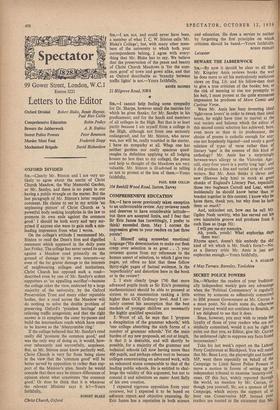Letters to the Editor
Oxford Divided Robert Blake, Renee Haynes, Paul Ries Collin Comprehensive Education Robin Pedley Beware the Jabberwock A. B. Stables Secret Police Powers Peter Benenson Murder Most Foul Frederick Stopp Mechanised Brigade David Richardson
OXFORD DIVIDED SIR,—Clearly Mr. Stinton and I are very un- likely to agree about the merits of Christ Church Meadow, the War Memorial Garden, or Mr. Sandys, and there is no point in our having a public wrangle on the matter. But the last paragraph of Mr. Stinton's letter requires comment. He claims to see in my article 'an unpleasing picture' of Christ Church as 'a powerful body seeking loopholes in the law to promote its own ends against the common good.' I should be both sorry and very sur- prised if anyone else were to gain such a mis- leading impression from what I wrote.
On the college's attitude I recommend Mr. Stinton to read the Dean's firm and dignified statement which appeared in the daily press last Friday. The college has never rested its case against a Meadow road primarily on the ground of damage to its own interests—or even of the far graver damage to the interests of neighbouring colleges and institutions. Christ Church has opposed such a road— described even by one of Mr. Sandys's ardent supporters as 'an appalling sacrifice'—because the college takes the view, endorsed by a large majority of the university, by the Oxford Preservation Trust and many other reputable bodies, that a road across the Meadow will do nothing to solve the double problem of preserving Oxford's 'priceless heritage' and relieving traffic congestion; and that the right answer is to complete the outer by-passes and build the intermediate roads which have come to be known as the 'Abercrombie ring.'
If the college believed that Mr. Sandys's road really did 'promote the common good,' and was the only way of doing so, it would, how- ever reluctantly and sorrowfully, acquiesce. But, as Mr. Stinton must know perfectly well, Christ Church is very far from being alone in the view that the 'common good' will be better served by opposition to rather than sup- port of the Minister's plan. Surely he would concede that there may be sincere differences of opinion about what constitutes `the common good.' Or does he think that it is whatever the relevant Minister says it is?—Yours faithfully,










































 Previous page
Previous page